
TORONTO INTERNATIONAL FILM FESTIVAL 2009 REVIEW
john cribbs
Day 1
Antichrist.
I tried to approach this one from a variety of different angles. Tongue-in-cheek arthouse experiment? Straight-faced horror film? Von Trier's essay on female suffering vs a woman's natural vileness and criticism of intellectual grief therapy? Even if I wasn't exhausted from trying to access the film correctly, I can safely say it didn't work for me on any level: the final third starts to work as a horror movie but its relation to horror movies that have come before (especially Don't Look Now and Possession) bogged it down. The final third is a huge improvement over the beginning of the movie, but it's hard to tell when the director's being serious - it's the perfect example of how Von Trier would be a genius if he wasn't such an idiot.
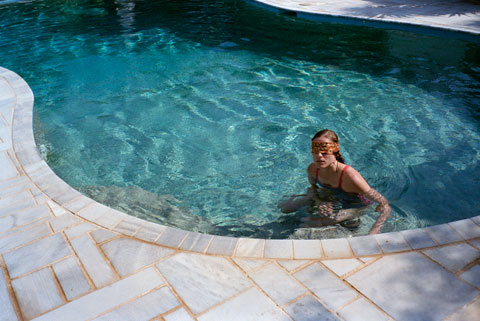
Dogtooth.
I thought I was going to hate this film for a good 30 minutes, but honestly that might be because I was already sick of unflattering sex scenes after Antichrist. This one's actually great; it's disturbing and extremely funny. Imagine The Village set in a David Hockney photograph: the worst aspects of parenting - puritanical upbringing, miseducation, fear of childrens' exposure to media/movies and even the way people manipulate their kids to make them happy - are exaggerated to horrifically absurd levels. The film that kept coming to mind while watching Dogtooth was Pasolini's Salo - both films track the tragic consequences of an isolated society where the old corrupt the young, complete with self-aware political connotations.
Fish Tank.
From Red Road's Andrea Arnold, this is the story of a lower-middle class British teen who may or may not find escape and self-expression through hip hop dancing or the love of Michael Fassbender. Long story short: who cares? All of her previous film's worst aspects (sloppy hand-held shots, heavily-accented improvising) are on display, none of the characters are particularly sympathetic and the film has a unearned sentimental ending. Basically the entire movie is like Red Road's terrible final half hour, although there's one extended scene that almost makes it worthwhile...but not quite. Michael Fassbender's a good looking guy, though (my wife doesn't agree.)
Nymph.
Meh. Lots of shots of leaves, three minute reaction shots, rail-thin Thai actors moping about. It shares some striking plot similarities with Antichrist, including marital anxieties and nude cavorting with overgrown oaks. I understood everything that happened in this film, and yet nothing really made any sense. The one thing that would have made sense is if this film ended with the Tarkovsky dedication rather than Antichrist - Nymph's plodding pace was clearly inspired by the long camera strolls through nature in The Sacrifice.
Day 2
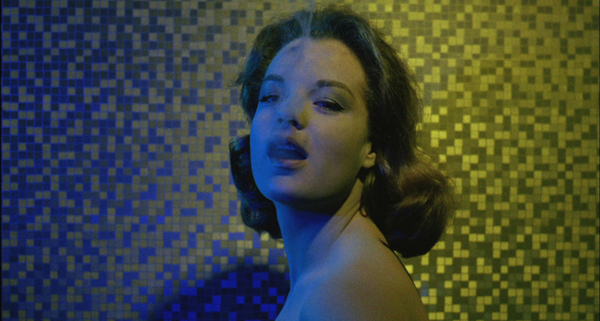
L'Enfer de Henri-Georges Clouzot.
I would have been happy enough to have just seen all the soundless test footage and existing scenes from Clouzot's unfinished 1964 film Inferno. But this documentary pieces together the whole story of why the production fell apart despite an unlimited budget (in brief: slow production, lead actor quit, director suffered a heart attack filming a hot lesbian make-out scene on a boat.) The experimental shots inspired by then-fashionable kinetic art and some amazing looking images from the film itself clearly highlight the doc, which for its part offers the guy from Color of Lies and the gal from OSS 117 performing un-shot scenes from the script and interviews with the miserable souls who lived to tell the tale. Would this have been Clouzot's masterpiece? Definitely not, but it's intriguing to imagine what would have come out of all this (I challenge any film this year to compose anything as gorgeous as the shot of Serge Reggiani under the bridge.)
A Prophet.
My reaction to The Beat My Heart Skipped was neutral at best. It featured well-directed scenes of tension and sudden violence, but none of them had any lasting effect to the overall story. Prophet had the same problem: although there's plenty of prison-set assaults and murders that make for entertaining suspense sequences, nothing seems to matter much one scene later. Themes of ethnic identity are also set up but are so generic that the racial backgrounds are completely interchangeable. A good performance by the lead actor makes it interesting enough to sit through, but let's not go nuts. It would be fair to say this is as good as anything Scorsese would make today, although frankly that's not saying much.
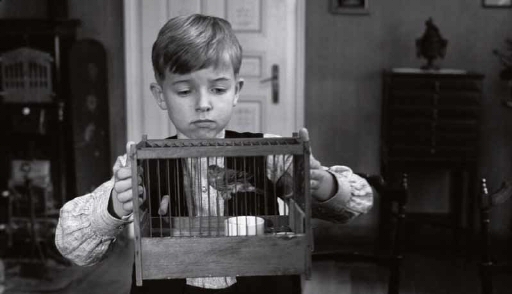
The White Ribbon.
Long story short, I loved it. Not only is this a different kind of film for Haneke, it's a use of film language and structure that feels new. There's an austerity that's so perfectly controlled and mature that the film's slow pace is mesmerizing (take note, Pen-Ek Ratanaruang.) And you know a lot of people aren't reading this movie right. It's not really about the way a society forms under despotism or even how children develop based on their upbringing; it's actually about the collective vileness that emerges from an absolute government. Strict religious morals, sexual tyranny, political oppression – from these casual social factors, what kind of generation is bred and who's going to recognize it? I can't wait to see this one again.
Soloman Kane.
I can only attest to the first 20 minutes of this film, but from what I gathered it's a movie where a guy who looks like a muddy Rupert Everett and dresses like Hugh Jackman's Van Helsing fights the devil and other hellish creatures circa 1600. Relatively straight-faced although over-use of CG imagery in the opening scene was a turn-off - what's wrong with doing a period-fantasy-adventure film like the original Conan (also taken from the pulp pages of Robert E Howard) old school with sets and models? The curse of Stephen Sommers I guess.
The Father of My Children.
I'm not really sure what the point of this one was. I know it's based on Humbert Balsan, and it kind of captures how tough it must be for hot shot film producers to juggle family life, bank loans and inflated director egos etc., but the film limps on long after its predictable "twist." There's no better way to point out the flaws of your subplots than to drop the main one halfway through the film. The lead actor (who seems familiar but I can't place him) is charming in a very French way, but again once he's out of the picture there's little to sustain the remaining running time. All is Forgiven made it seem like Hansen-Love could be the new Agnes Varda, but while her new movie isn't bad per se it reminded me more of the Claude Sautet/Maurice Pialat school of ho-hum French cinema.
Day 3
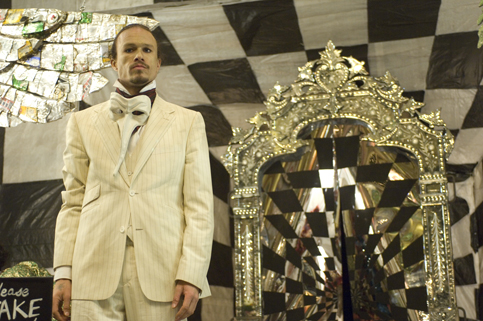
The Imaginarium of Dr. Parnassus.
In this film, an immortal being known as the Doctor hangs around London in a magic box with his companions – one character has the ability to transform into an entirely different man. But moving beyond its familiar-sounding premise and messy structure, I didn't hate this as much as The Brothers Grimm or Tideland. Don't get me wrong: it's not any good. Special effects and art design work overtime to make the world "magical" while the plot and characters remain underdeveloped. The forced-fantasy lands of all these imaginariums and Magoriums (not to mention Burtonoriums) seem well-intentioned but just serve as a reminder of how creatively bankrupt the film industry has become. As for the loss of Ledger - it isn't a problem until the end of the film, where his character disappears and it becomes an entirely different movie that makes no sense. Tom Waits makes for a charming Devil, but did we need that much Verne Troyer?
Le Refuge.
Dealing with lonely motherhood at a secluded beach house didn't work out too well for Sasha Hails in See the Sea, but Isabelle Carre manages lonely pregnancy ok in Ozon's latest, which also happens to be his tamest (strange for a movie that opens with a gross and realistic fatal OD.) My wife being pregnant, I was curious to see what he had to say about pre-natal anxiety but it turns out that chilling at a gorgeous beachhouse with an equally hot gay guy is enough to straighten out an expectant former-junkie out. With the exception of two scenes it lacks the sinister tone of his best work and has none the campy aspects of his interesting near-misses, the lead actress isn’t particularly good or attractive – I figure this one's destined to get lost in his large filmography.
Air Doll.
It looked like Kore-eda was going to be serving up a weird blend of Lars and the Real Girl and Mannequin, but it quickly becomes apparent that this is his version of a Disney movie: a Disney movie about a blow-up sex doll who comes to life. There's something giddily subversive in that, and it's a good movie although for its two-hour running time it could've been a short (it has that "anthology film" feel to it.) Overall a charming B-side to last year's phenomenal Still Walking, but nowhere near that level of greatness. The same kind of sentimentalism that heavily weighed down After Life turns up about halfway through the film: I'm just not able to accept that we're all really blow-up sex dolls at heart. A lot of credit goes to Du-na Bae as the title heroine.
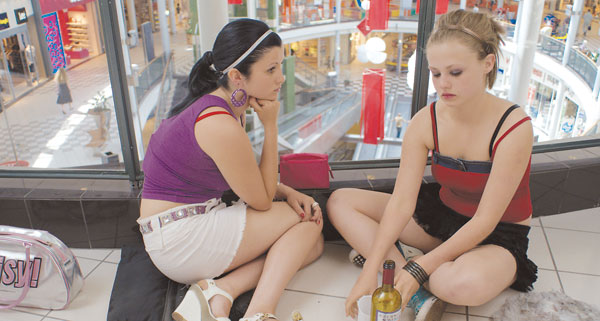
Mall Girls.
Surprisingly effective Polish film about teenage girls giving blow jobs to strangers in exchange for fashionable jeans and judging folks by their cell phones in the same kind of bleak Central European locales as Lilya 4-Ever and Import/Export. The direction is good, the lead actress is very good (kind of a combination of the Water Lilies girl and Michelle Trachtenberg), and although the big "consequence" at the end of the movie goes a little overboard there is a very satisfying climatic confrontation in a bathroom. It's funny: I'd have thought the Larry Clark-brand of "kids ain't alright" cinema had run its course, but Katarzyna Roslaniec's film (an extension of her earlier short) succeeds by playing more like a straight-faced Mean Girls. And the neglectful-parent subplot feels more authentic than, say, Fish Tank.
Face.
A not-surprisingly tedious endurance test from Tsai Ming-Liang (if you're a fan of women covering large windows with duct tape in real time, prepare to be riveted.) The screening lost a large number of audience members, all of whom missed out on Laetitia Casta's very memorable Salome dance near the end of the film. In my TIFF review I said this director's films could be judged by the worthiness of their individual set pieces. Of the 2 1/2 hours of extended shots, there were maybe a half dozen interesting ones – including an apartment plumbing disaster, attempts to drag the heavy train of a theater costume up some stairs and Jean-Pierre Leaud as a crazy old French actor who declares his pet bird a better director than Pasolini. Mathieu Amalric is a serious contender for weirdest cameo of the year.
Day 4
Get Low.
Overall an unremarkable effort hampered by poor use of music but elevated by a good cast. We've got a surly Bobby Duvall, the always charming Sissy Spacek, an amusingly anachronistic Bill Murray (basically reprising his Wild Things self-conscious huckster) and Lucas Black, who's been proving himself a reliably charismatic cinematic presence over the last few years. He's the reason I saw the movie (that and there was nothing else programmed in that time slot) and he did a fine job, so I suppose that's good enough for me.
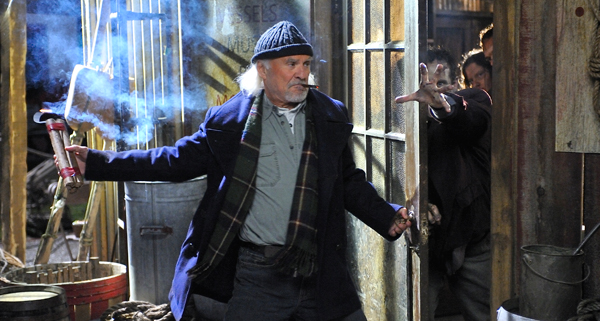
George A Romero's Survival of the Dead.
I honestly don’t know what Romero's going for with this series anymore. There's a scene in this latest installment of his "Dead" saga where a guy throws a grenade at a group of gunmen, the smoke clears, and the dudes are standing there with – seriously – soot on their clothes and faces looking like dumbfounded cartoon characters. If he's abandoned any kind of serious approach to the series and can only offer yet another goofy horror romp like Zombieland, there seems little reason to continue unless he wants to seem more and more like a cheap imitation of his former self. I thought he had a shockingly positive start with Land of the Dead, then a huge artistic belly flop with Diary of the Dead - Survival is not quite the train wreck the last one was, but the makeup effects and visual ideas aren't nearly as good either. So I guess it's a split, but sadly there's really nothing to recommend.
(The cinematic gods can judge me for skipping out on Marco Bellocchio's Vincere to catch the Eagles game. Certainly the football gods were not with Jake Delhomme and the Panthers.)
Bitch Slap.
Nobody was more excited for a good old Russ Meyer tribute than me, and from the opening credits – a rapid-fire series of images from classic "tough girl" movies – it seems like that's what was intended. You'd think the creators of "Xena: Warrior Princess*" would understand that kind of film really well, but Bitch Slap misses the spirit of sexploitation cinema. At the same time, it's not quite the post-modern Tarantino-esque tribute they’re clearly going for. Bitch Slap is more like a 2nd rate Robert Rodriguez directing a script by the Crank guys' 14-year-old nephews (not that it isn't rife with borrowed QT bits like a katana sword that’s important to the plot, a psychotic Asian girl wielding a chain weapon and a character who declares she's about to "get medieval." The extended fight scenes are also nothing to write home about, once proving again that Zoe Bell is overrated.) The ladies have large cleavage and pull out insults like "dick slash," "magic mouth" and "super blow," but the whole thing seems forced, redundant and unfunny.
*Best part: cameos by Xena and Gabriella as nuns. Kevin Sorbo's in there too.
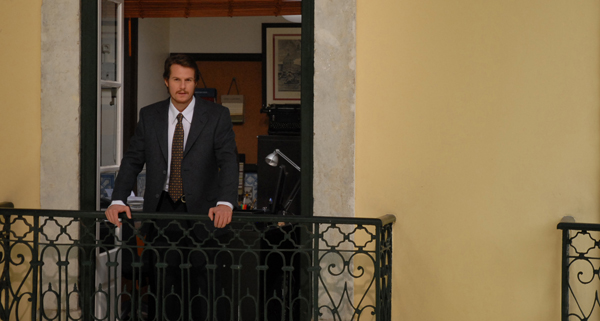
Eccentricities of a Blonde-Haired Girl.
I've never seen anything by Manoel de Oliveira until today, so I can't compare this one to his older work. Therefore I'm not sure whether all his movies are this oddly dispensable or if this is just a late career miscalculation. Despite its 63-minute run time, the film seems padded to stretch it out to feature length: unnecessary scenes of train riding, mail opening and poetry reading. Not only does he employ a bland, interminably long establishing shot of the town – he goes back to the exact same shot five or six times! The story is like That Obscure Object of Desire without anything that made that movie amazing and yet there's a long sequence where the characters talk reverently about Eca de Queiros, author of the short story that served as this film's inspiration.
<<Previous Page 1 2 Next Page>>
home about contact us featured writings years in review film productions
All rights reserved The Pink Smoke © 2009